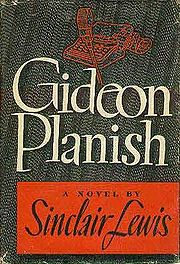
Gideon Planish
Encyclopedia

Sinclair Lewis
Harry Sinclair Lewis was an American novelist, short-story writer, and playwright. In 1930, he became the first writer from the United States to be awarded the Nobel Prize in Literature, "for his vigorous and graphic art of description and his ability to create, with wit and humor, new types of...
. The novel tells the story of Gideon Planish, an unprincipled social climber who becomes involved in various shady philanthropic organizations in his quest for stature without accountability. The work did not fare as well with critics as some of Lewis' earlier social novels, and is considered one of his minor works.
Plot summary
Gideon Planish (1943) takes aim at less-than-honorable fundraising organizations. In a similar manner of his other works, the reader follows the self-titled character through his life and numerous (but slightly related) professions dealing with professional "organizationality" which is better known as the for-profit industry of pompous fundraising run by shady "philanthropists" running a wide variety of guilds, committees, foundations, leagues and councils for selfish and greedy purposes.The focus of the book begins with a young Gideon demonstrating a knack for public speaking, and these skills follow him through his self-motivated and selfish undergraduate years at Adelbert College. The book then picks up an older but still vacuous Gideon, now a Professor of Rhetoric at Kinnikinick College, when he finally meets the girl of his dreams; young coed Peony Jackson of Faribault, Minnesota
Faribault, Minnesota
As of the census of 2000, there were 20,818 people, 7,472 households, and 4,946 families residing in the city. The population density was 1,644.8 people per square mile . There were 7,668 housing units at an average density of 605.8 per square mile...
.
Motivated by vague dreams of importance, including a dream of becoming a U.S. senator, Gideon begins his campaign for social ascension by moving from one job to another with the hopes of meeting "like-minded thinkers" with vague goals and even more flexible morals when it came to raising money for a wide variety of causes. Over the years, Gideon's path to easy money with no accountability leads him to:
- The Dean of Kinnikinick College where he begins to use this role as a springboard of notoriety by banishing books (Garfield County Censorship Board) and join do-nothing boards (including the Sympathizers with the Pacifistic Purposes of the New Democratic Turkey) to get his name out in the marketplace of opportunity.
- Editor of Rural Adult Education publication
- Itinerant Lecturer (between jobs) reusing his inventory of high style/low content messages.
- Managing Secretary of the Heskett Rural School Foundation
- Administration of the Association to Promote Eskimo Culture
- Ghostwriter of the autobiography of William T. Knife, creator of Okey-Dokey, a beverage juiced with maximum caffeine for the masses
- Assistant General Manager of the Citizen's Conference on Constituational Crisises in the Commonwealth (Cizcon)
- Director General of "Every Man a Priest Fraternity" office
- Directive Secretary of the Dynamos of Democratic Direction
At 50 years old, when fatigued with the never-ending demands of generating self-importance combined with his realization that he lacked substance and true gravitas, Gideon has an opportunity to return to Kinnikinick College as its next President and allow him to finally begin to achieve something valid. Through a series of realizations by both himself and Peony, he remains in New York and daily regets their decision.
Comparing to other works
Gideon Planish is considered a minor work and it was obvious Lewis was rehashing many of his old ideas as many themes and points ring familiar with the target being the shady industry of less-than-legitimate fundraising organizations. While the main character was without moral boundaries, he did remain loyal to his wife (a rare quality in Lewis' characters) but he never achieved anything genuine or of substance as he attempted to achieve everything which focused on style and perception. An earlier character of Lewis', Elmer GantryElmer Gantry
Elmer Gantry is a satirical novel written by Sinclair Lewis in 1926 and published by Harcourt in March 1927.-Background:Lewis did research for the novel by observing the work of various preachers in Kansas City in his so-called "Sunday School" meetings on Wednesdays. He first worked with William L...
, crosses paths with Planish several times in the book but their interactions serve only as a method to emphasize to the reader the similarities between the crooks in organized religion and the crooks in general philanthropy.
One of the major reasons causing the novel to be considered relatively minor is the recurring themes of earlier works. These recurring themes imply the creative energy of Lewis was ebbing versus a larger strategy of aligning earlier messages into a larger overall theme. Critics at the time made less than glowing comments and suggested Sinclair Lewis' best days were behind him. The book is not considered one of his best and is usually read by Lewis fans hoping to find a forgotten treasure similar to Dodsworth
Dodsworth
Dodsworth is a satirical novel by American writer Sinclair Lewis first published by Harcourt Brace & Company in March 1929. Its subject, the differences between US and European intellect, manners, and morals, is one that frequently appears in the works of Henry James.-Plot summary:Samual 'Sam'...
or The Job
The Job (1917 novel)
The Job is an early work by American novelist Sinclair Lewis. It is considered an early declaration of the rights of working women. The focus is on the main character, Una Golden, desire to establish herself in a legitimate occupation while balancing the eventual need for marriage...
.

